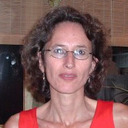22C3 - 2.2
22nd Chaos Communication Congress
Private Investigations
| Veranstaltungen | |
|---|---|

|
Hacking health |
Karin Spaink

Political writer
The first Dutch writer who put a homepage on the net, as a means of re-publishing my columns, essays, and books which are out of print. The web is indeed an excellent library. I started my homepage at the beginning of 1995. (There is a mailing list through which I distribute my columns (subscribe).
My subjects are varied, but I tend to write about matters of politics, technology, privacy, media, sex, health and bodies, and especially about the areas where these subjects merge or collide. Give me a brainbreaker, a couple of good books or papers on the subject plus three months, and I will come up with an essay that bites or seduces you, and that will give you a few ideas that you never thought of before.
For one of my books, Aan hartstocht geen gebrek («Passionate imperfections»), made together with photographer Gon Buurman and that deals with disabilities and sexuality, I was awarded the Mary Zeldenrust-Noordanus prize in 1993 for the gentle way in which we broached a highly taboo subject. Another book, Het strafbare lichaam («The penal body») sold almost 30,000 copies in one year. In that book, I coined the word «orenmaffia» (in English: «mind mob») for those New Age quack thinkers who believe that all diseases originate in the mind, and can only be «cured» via mental routes. The word became quite common and made it into the Dutch dictionaries.
In the middle of 1995, I got involved with civil rights issues on the net on a rather personal level: Scientology raided my provider, XS4all, over a homepage that one of their other customers had put on-line. That raid brought about a whole cascade of questions: are homepages the responsibilty of their makers, or of those through which systems they are served? Are internet providers to be regarded as publishers, or as common carriers? Is a complaint enough on the net to make a provider pull a page? How does censorship on the net work?
Through these questions, I became involved in freedom of speech issues. Meanwhile, I have learned a lot about the net, won three court cases against Scientology, I write and lecture about the net quite regularly, and have become involved in various organisations that strive to put the net to a political and educational use, to educate people and politicians about the net, to inform patients, and to define and defend civil rights on the net.
From 2002 to mid 2005, I was an external advisor for the Freedom of the Media bureau of the Organisation for Security and Cooperation in Europe (the OSCE) on the subject of internet and freedom of the media. In that capacity, I have written several articles and did various presentations for them, and have assisted in organising their expert conferences on Freedom of the media and the Internet, the second of which was held in August 2004. The first conference issued the Amsterdam Recommendations (June 2003). The third and final conference will be held June 17-18, in Amsterdam.
Furthermore, I was invited to join a government advisory committee investigating means and methods of giving patients a better position within the complex health care structure, and that seeks to enable them to (co-)define the way that care and cure are organised and implemented. We work under the ZonMW umbrella, and we both initiate and subsidise pilot projects and research.
As a board member (often chair) of a number of organisations, I have developed various managerial qualities, often helping to make non-profit organisations work more smoothly and more effectively, while never forgetting their ideological stance.
In May 2005, I started my own company, Spaink.net.
In April 2005, I became editor in chief of The Next Ten Years, a series of books dealing with developments and uses of the internet after its first booming decade. We will publish two books per year, each edition dealing with a different topic. The first book, to be published in September 2005, is about electronic patient records.
In May 2005, I embarked on another big project: researching and writing the history of Hack-Tic and XS4ALL. The book will cover the years between 1989, when Hack-Tic was started, and circa 2005. It is scheduled to appear in the summer of 2008.
